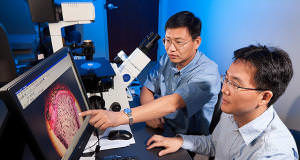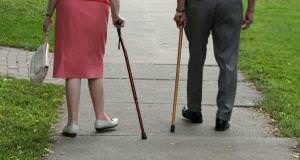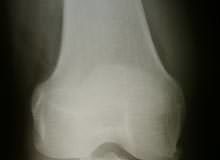Nanoscale Bone Samples Aid Research On Osteoporosis
A new technique developed at Rensselaer Polytechnic Institute allows researchers to collect large amounts of biochemical information from nanoscale bone samples. Along with adding important new insights into the fight against osteoporosis, this innovation opens up an entirely new proteomics-based approach to analyzing bone quality. It could even aid the archeological and forensic study of human skeletons.
Blueberries Help Lab Rats Build Strong Bones
Compounds in blueberries might turn out to have a powerful effect on formation of strong, healthy bones, if results from studies with laboratory rats turn out to hold true for humans.
Increasing Daily Calcium Will Not Reduce the Risk Of Fractures In...
While moderate amounts of calcium (around 700 mg a day) are vital for maintaining healthy bones, there is no need to start increasing calcium intake in order to reduce the risk of fractures or osteoporosis in later life, finds a paper published on the British Medical Journal website on May 24.
Before You Start Bone-Building Meds, Try Dietary Calcium and Supplements, Experts...
Has a bone density scan placed you at risk for osteoporosis, leading your doctor to prescribe a widely advertised bone-building medication? Not so fast! A University of Illinois study finds that an effective first course of action is increasing dietary calcium and vitamin D or taking calcium and vitamin D supplements.
Use Of Nitrates May Increase Bone Strength
Preliminary research indicates that use of nitroglycerin ointment among postmenopausal women for 2 years was associated with a modest increase in bone mineral density and decrease in bone resorption (loss), according to a study in the February 23 issue of JAMA.
Long-Term Use Of Osteoporosis Medication Associated With Increased Risk Of Atypical...
Older women who used bisphosphonates (medications that prevent loss of bone mass) for five years or more were more likely to experience "atypical" fractures involving the femoral shaft (bone in the leg that extends from the hip to the knee) or subtrochanteric (fractures in the bone just below the hip joint), compared to women with less usage.
Garlic Could Protect Against Hip Osteoarthritis
Researchers at King's College London and the University of East Anglia have discovered that women who consume a diet high in allium vegetables, such as garlic, onions and leeks, have lower levels of hip osteoarthritis.
Whey Supplements Lower Blood Pressure: Low-Cost Protein Gets Big Results In...
Beverages supplemented by whey-based protein can significantly reduce elevated blood pressure, reducing the risk of stroke and heart disease, a Washington State University study has found. Research led by nutritional biochemist Susan Fluegel and published in International Dairy Journal found that daily doses of commonly available whey brought a more than six-point reduction in the average blood pressure of men and women with elevated systolic and diastolic blood pressures.
For Elderly, Even Short Falls Can Be Deadly; Adults 70-Plus Three...
While simple falls, such as slipping while walking off a curb, may seem relatively harmless, they can actually lead to severe injury and death in elderly individuals, according to a new study published in The Journal of Trauma: Injury, Infection, and Critical Care.
Taking A Break From Osteoporosis Drugs Can Protect Bones, Study Finds
Taking time off from certain osteoporosis drugs may be beneficial to bone health, according to a study conducted at Loyola University Health System. Researchers found that bone density remained stable for three years in patients who took a drug holiday from bisphosphonates, a popular class of osteoporosis drugs that can cause fractures in the thigh bones and tissue decay in the jaw bone.
New Pain Treatment Is the Best Yet
A new approach alleviates osteoarthritis pain better than any drug available. A new class of pain relievers that targets musculoskeletal pain receptors, instead of more general pain pathways, could alleviate osteoarthritis pain better than any drug now on the market, but hurdles remain before it's approved by the U.S. Food and Drug Administration. Research on the new therapy was published yesterday in the New England Journal of Medicine.
Daily Vibration May Help Aging Bones Stay Healthy
A daily dose of whole body vibration may help reduce the usual bone density loss that occurs with age, Medical College of Georgia researchers report. Twelve weeks of daily, 30-minute sessions in 18-month old male mice -- which equate to 55- to 65-year-old humans -- appear to forestall the expected annual loss that can result in fractures, disability and death.


















